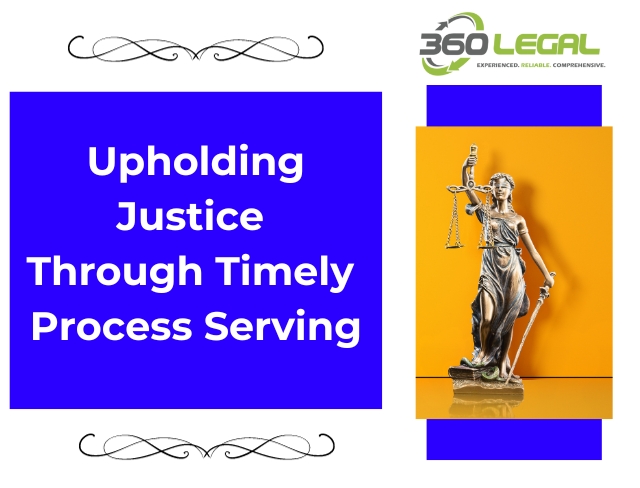Testing RSS Feeds.. ignore post.
Testing RSS Feeds.. ignore post.
Upholding Justice Through Timely Process Serving

The judiciary system operates on principles of fairness, accountability, and above all, justice. While many elements contribute to the realization of these ideals, one component that often goes underappreciated is process serving. This function ensures that all parties in a case are aware of the legal actions being taken against them, giving them an opportunity to respond. When performed correctly and on time, process serving can be a linchpin in the upholding of justice. In this article, we will delve into the importance of timely process serving, the challenges faced, and the strategies to overcome these challenges.
The Significance of Timely Service
In any legal case, time is often of the essence. A delay in serving papers can lead to a cascading series of setbacks that could compromise the integrity of the entire legal process.
Preservation of Due Process
One of the fundamental elements of a just legal system is the principle of due process which guarantees fair treatment through the judicial system. Timely service of process is a cornerstone of due process. If papers aren’t served promptly, parties may not have adequate time to respond or prepare, thus undermining their right to fair proceedings.
Risk Mitigation
Timely service of legal documents also mitigates the risk of legal complications that could arise from delays. For instance, in time-sensitive cases like restraining orders, a delay in serving papers can put someone’s safety at risk. The immediate serving of papers is therefore not just a procedural necessity but can also have tangible impacts on people’s lives.
Judicial Efficiency
A timely service process also contributes to the efficiency of the judicial system as a whole. Delays in serving papers can create bottlenecks in court schedules, pushing back trial dates and wasting valuable court resources. This inefficiency can lead to extended pre-trial detentions for some and longer wait times for justice to be served for others.
Builds Trust in the System
When process serving is conducted in a timely and efficient manner, it builds trust in the judicial system. Parties are more likely to engage cooperatively when they perceive the system as fair and efficient. This trust is particularly important for those who may already be skeptical or fearful of legal proceedings, such as marginalized communities.
Economic Implications
There are also economic benefits to timely service. Delays can result in extended legal proceedings, which in turn can lead to increased legal costs for all parties involved. The economic toll extends beyond the litigants to affect the broader community, as courts are funded by taxpayers. Timely service helps keep these costs in check. In essence, the timeliness of process serving is intertwined with the fairness, efficiency, and trustworthiness of the legal system. Its impact reaches far beyond mere procedural formality, affecting the lives of individuals and the community at large.
Guarantees Fairness
By serving legal papers in a timely manner, you guarantee all parties have sufficient time to prepare for legal proceedings. This ensures an equitable playing field, which is essential for justice to be served.
Maintains Legal Timelines
Most legal cases have strict deadlines for filing responses, submitting evidence, and making court appearances. Timely service ensures these deadlines can be met by all parties, avoiding unnecessary delays that could prejudice one side.
Challenges in Timely Service
Despite its importance, the task is fraught with challenges that could compromise its timeliness. Challenges such as navigating complex logistical factors, such as geographic distances or restricted access areas, which can contribute to delays. Moreover, ongoing global and national events, such as pandemics or civil unrest, can unexpectedly disrupt standard process serving routes and timelines, demanding a higher level of adaptability and contingency planning.
Unpredictable Respondents
The people who are being served can sometimes be evasive or even hostile, making it a challenge to complete the process on time.
Regulatory Constraints
The rules and regulations governing process serving can vary widely between jurisdictions, leading to complexity and potential delays.
Strategies for Timely Service
Understanding the challenges is the first step toward devising effective strategies for timely service.
Technology as an Ally
Utilizing GPS and other tracking technologies can greatly improve the efficiency of serving papers. Additionally, software solutions can help manage schedules and provide real-time updates.
Professional Training
A well-trained process server understands how to handle difficult situations and knows the regulations inside and out, ensuring a smoother and faster process.
The following is a DRAMATIZATION AND IS NOT AN ACTUAL EVENT: Jane was in the middle of a custody battle with her ex-spouse. She hired a process serving company known for its efficiency and use of technology. When the server couldn’t locate the ex-spouse initially, they utilized GPS tracking and real-time updates to coordinate with Jane. Finally, the papers were served on time, allowing Jane to meet her court deadlines and successfully gain custody of her children.
The timeliness of process serving has far-reaching implications for the justice system. Delays can result in miscarriages of justice, whereas punctual service ensures fairness and maintains the integrity of legal timelines. By investing in technology and professional training, process serving companies can significantly improve their efficiency, contributing to a more equitable and just legal system.
The Role of Client-Server Communication
Open Channels for Timely Updates
One of the critical factors in ensuring timely service is the line of communication between the process server and the client. Open and regular communication allows for swift adjustments to any unexpected situations, enhancing the probability of meeting deadlines.
Documentation for Accountability
Another crucial element of client-server communication is proper documentation. Detailed records of each step taken, including attempts, successes, and failures in serving papers, can prove invaluable. This documentation not only serves as a record for legal purposes but also holds the process serving company accountable for their timelines. The link between process serving and justice is often underestimated, yet it is vital. As we’ve seen, from guaranteeing fairness to maintaining legal timelines, the timely serving of papers plays an indispensable role. With the implementation of advanced technology, professional training, and efficient communication, we can uphold the high standards required for the justice system to function effectively.
Conclusion
Process serving is more than just a logistical step in the legal system; it is a critical component in upholding justice. The timeliness of this service ensures fairness for all parties involved, maintaining the integrity of legal timelines and enabling the smooth progression of cases. Although challenges like unpredictable respondents and varying regulations can pose obstacles, strategic approaches such as the incorporation of technology, professional training, and effective client-server communication can mitigate these issues. The end goal is clear: to create a more efficient, transparent, and ultimately just legal system. By focusing on the timeliness and effectiveness of process serving, we take a significant step toward achieving that noble objective.
Author
We are Social!
Latest tweets
Popular Tags
Testimonials
"5 star service ! prompt serving, helpful, professional . "
"Mike is awesome. Our firm has hired him on several occasions and we are very happy with his work. His prompt serving, helpful, professional and always in communication. I recommend him highly! "
"360Legal provides speedy and easy to use Process Service that is flexible, and very transparent with nearly instant reporting. It is very helpful for us to be able to track the status of our process service jobs, especially when they are time sensitive. "
Latest News
-

RMAI 2021 Annual Conference RMAI Annual Conference
April 12-15, 2021 -

NATIONAL CREDITORS BAR ASSOCIATION 2020 SPRING CONFERENCE
May 19-21, 2021 -

ALFN ANSWERS 2021
Jul 18-21, 2021 -

Annual Convention and Expo
Oct. 17-21, 2021 -

Florida Association of Professional Process Servers 33rd Quarter Board Meeting/Professional Beach Getaway
Aug. 20-22, 2021












